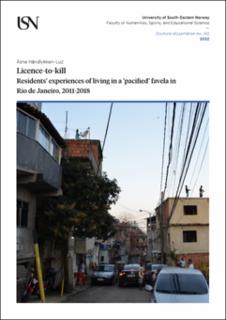| dc.contributor.author | Håndlykken-Luz, Åsne | |
| dc.date.accessioned | 2022-10-18T07:44:19Z | |
| dc.date.available | 2022-10-18T07:44:19Z | |
| dc.date.issued | 2022 | |
| dc.identifier.isbn | 978-82-7206-714-3 | |
| dc.identifier.issn | 2535-5252 | |
| dc.identifier.uri | https://hdl.handle.net/11250/3026529 | |
| dc.description.abstract | Since 2008, Police Pacification Units (UPPs) have been installed in numerous favelas in Rio de Janeiro. Drawing on multi-phase ethnographic fieldwork in the favelas of Pavão- Pavãozinho and Cantagalo (PPG), I analysed residents’ everyday experiences of living in a so-called ‘pacified’ favela from 2011 to 2018. In the first few years, residents emphasised several positive aspects of the pacification programme; it was a period in which the presence of weapons and shootouts on the streets decreased. The results suggest that, although the UPP police were trained in human rights and promoted a discourse of citizenship, the pacification process aimed at ‘civilising’ residents who were regarded as ‘undesirable others’. In the period 2017 to 2019, shootouts have occurred daily, weapons are back on the streets, and residents noted that they felt like hostages between the police and traffickers.
Drawing on black Brazilian scholars, activists, and feminists as well as decolonial, postcolonial, and poststructural scholars, I argue that pacification and urban militarisation are increasingly racialising and targeting blacks through necropolitical violence in a context that simultaneously celebrates both whiteness and diversity and where bodies are increasingly borderised through the work of death.
First, the findings indicate how residents’ experiences of living alongside changing urban (in)security politics across a decade display unforeseen or ‘polyhedral’ facets of power and practices of everyday resistance. Second, I argue that the pacification and militarisation processes operated as a ‘changing same’ articulated through polyhedral facets genealogically re-actualised through the ‘coloniality of power’ (Quijano, 2008), and new forms of ‘borderising bodies’ (Mbembe, 2019a), drawing on racialisation. The ‘changing same’ of pacification/militarisation displays itself as a physical, social, and cultural lynching of Afro-Brazilians. This is articulated through what I call the ‘(de)colonial polyhedron of powers’, which unfolds dynamics of necropolitical violence challenged by everyday quilombo (Afro Brazilian maroon societies) practices and cultural resistance (Nascimento, 2021), beyond the physical territory of the favela; this is conceptualised through the notion of the ‘corpo-fronteira’ (body border). | en_US |
| dc.language.iso | eng | en_US |
| dc.publisher | University of South-Eastern Norway | en_US |
| dc.relation.ispartofseries | Doctoral dissertations at the University of South-Eastern Norway;142 | |
| dc.relation.haspart | Paper 1: Håndlykken-Luz, Å. (2019). Polyhedron of powers, displacements, socio-spatial negotiations and residents’ everyday experiences in a ‘pacified’ favela. ACME: An International Journal for Critical Geographies 18(6): 1321–1346. doi: 10.1080/01419870.2020.1800774 | en_US |
| dc.relation.haspart | Paper 2: Håndlykken-Luz, Å. (2020). ‘Racism is a perfect crime’: Favela residents’ everyday experiences of police pacification, urban militarization, and prejudice in Rio de Janeiro. Ethnic and Racial Studies 43(16): 348–367. doi: 10.1080/01419870.2020.1800774 | en_US |
| dc.relation.haspart | Paper 3: Håndlykken-Luz, Å. (2021). From ‘pacification’ to ‘licence-to-kill’: Favela residents’ experience with the UPP, 2011-2018. Brasiliana: Journal for Brazilian Studies, 10 (1): 126-153. doi: 10.25160/bjbs.v10i1.126199 | en_US |
| dc.relation.haspart | Paper 4: Håndlykken-Luz, Å. (2022). Field note – extracts: Visual field notes from a fractured longitudinal ethnographic research of Rio de Janeiro’s favelas (in review Cultural Geographies - omitted from the online version) | en_US |
| dc.rights | Attribution-NonCommercial-NoDerivatives 4.0 Internasjonal | * |
| dc.rights.uri | http://creativecommons.org/licenses/by-nc-nd/4.0/deed.no | * |
| dc.title | Licence-to-kill: Residents’ experiences of living in a ‘pacified’ favela in Rio de Janeiro, 2011-2018 | en_US |
| dc.type | Doctoral thesis | en_US |
| dc.description.version | publishedVersion | en_US |
| dc.rights.holder | © The Author, except otherwise stated | en_US |
| dc.subject.keyword | UPP (Police Pacification Unit) | |
| dc.subject.keyword | pacification | |
| dc.subject.keyword | everyday urban politics | |
| dc.subject.keyword | police violence | |
| dc.subject.keyword | urban militarisation | |
| dc.subject.keyword | necropolitics | |
| dc.subject.keyword | borderising bodies | |
| dc.subject.keyword | (de)colonial polyhedron of powers | |
| dc.subject.keyword | corpo-fronteira | |
| dc.subject.keyword | genealogy | |
| dc.subject.keyword | Brazil | |

